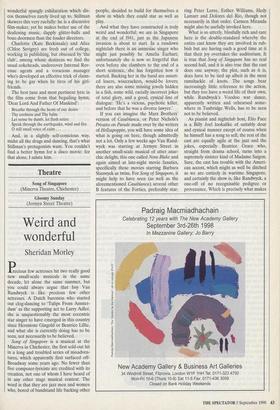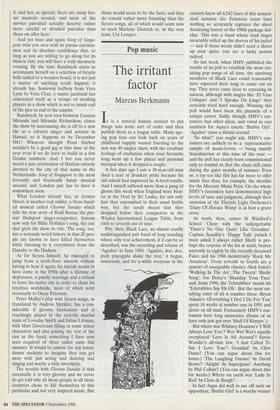Theatre
Song of Singapore (Minerva Theatre, Chichester) Gloomy Sunday (Jermyn Street Theatre)
Weird and wonderful
Sheridan Morley
Precious few actresses hit two really good new small-scale musicals in the same decade, let alone the same summer, but you could always argue that Issy Van Randwyck is like precious few other actresses. A Dutch baroness who started out clog-dancing to 'Tulips From Amster- dam' as the supporting act to Larry Adler, she is unquestionably the most eccentric star singer to have emerged in this country since Hermione Gingold or Beatrice Lillie, and what she is currently doing has to be seen, not necessarily to be believed.
Song of Singapore is a musical at the Minerva in Chichester, the first sold-out hit in a long and troubled series of misadven- tures, which apparently first surfaced off- Broadway some years ago. No fewer than five composer-lyricists are credited with its creation, not one of whom I have heard of in any other stage musical context. The word is that they are jazz men and women who, bored of bandstand life backing other people, decided to build for themselves a show in which they could star as well as play.
And what they have constructed is truly weird and wonderful; we are in Singapore at the end of 1941, just as the Japanese invasion is about to start. In a rundown nightclub there is an amnesiac singer who might just possibly be Amelia Earhart; unfortunately she is now so forgetful that even before she clambers to the end of a short sentence, she has forgotten how it started. Backing her in the band are assort- ed losers, wisecrackers, would-be lovers; there are also some missing jewels hidden in a fish, some wild, racially incorrect jokes of total glory, and a good, cynical line of dialogue: 'He's a vicious, psychotic killer, and before that he was a divorce lawyer.'
If you can imagine the Marx Brothers' version of Casablanca, or Peter Nichols's Privates on Parade made over by the writers of Hellzapoppin, you will have some idea of what is going on here, though admittedly not a lot. Only a few weeks ago Van Rand- wyck was starring at Jermyn Street in another small-scale musical of utter anar- chic delight, this one called Nora Blake and again aimed at late-night movie fanatics, specifically those movies starring Barbara Stanwyck as twins. For Song of Singapore, it might help to have seen (as well as the aforementioned Casablanca) several other B features of the Forties, preferably star- ring Peter Lorre, Esther Williams, Hedy Lamarr and Dolores del Rio, though not necessarily in that order. Carmen Miranda might also be usefully invoked here.
What is so utterly, blissfully rich and rare here is the double-standard whereby the entire cast know they are involved in rub- bish but are having such a good time at it that their joy overtakes the auditorium. It is true that Song of Singapore has no real second half, and it is also true that the cast does one anyway; the plot, such as it is, does have to be tied up albeit in the most ramshackle of knots. The songs bear increasingly little reference to the action, but they too have a weird life of their own, while Randwyck's Voodoo war dance, apparently written and rehearsed some- where in Tunbridge Wells, has to be seen not to be believed.
As pianist and nightclub host, Elio Pace is a Billy Joel lookalike of suitably dour and cynical manner except of course when he himself has a song to sell; the rest of the cast are equally agile at the jazz and the jokes, especially Beatrice Grace who, straight from drama school, turns into a supremely sinister kind of Madame Saigon. Sure, the cast has trouble with the Ameri- can accent, which might as well be ditched as we are entirely in wartime Singapore, and certainly the show is, like Randwyck, a one-off of no recognisable pedigree or provenance. Which is precisely what makes it, and her, so special; there are many bet- ter musicals around, and most of the movies parodied actually deserve rather more careful or detailed parodies than those on offer here.
And yet time and again Song of Singa- pore wins you over with its joyous careless- ness and its absolute confidence that, so long as you are willing to go along for its bizarre ride, you will have a truly mesmeric evening. By the time Randwyck starts to accompany herself on a selection of bicycle bells nailed to a wooden board, it is not just a matter of anything could happen; it already has. Someway halfway from Vera Lynn to Vera Cruz, a manic jazzband has reinvented itself as a troupe of strolling players in a show which is not so much end of the pier as end of the empire.
Randwyck, by now torn between Carmen Miranda and Miranda Richardson, closes the show by announcing she is off to a new life as a cabaret singer and aviatrix in Hawaii; so it happens to be December 1941? Whoever thought Pearl Harbor wouldn't be a good gig at that time of the year even if we do have to build in a few Geisha numbers. And I bet you never heard a jazz celebration of Harlem entirely devoted to the city of that name in the Netherlands. Song of Singapore is the most fervently and frantically funny musical around, and London just has to have it somewhere soon.
What London already has, at Jermyn Street, is another real oddity, a three-hand- ed musical called Gloomy Sunday which tells the true story of Rudi Seress, the pre- war Budapest singer-songwriter, famous now only for Billie Holliday's song, the one that gives the show its title. The song, too, has a seriously weird history in that 20 peo- ple are known to have killed themselves while listening to it everywhere from the Danube to the Hudson.
As for Seress himself, he managed to jump from a tenth-floor window without having to hear it again; his suicide seems to have come in the 1950s after a lifetime of depression, a patchy marriage and a refusal to leave his native city in order to claim his royalties worldwide, most of which went eventually to Oscar Peterson.
Peter Muller's play with Seress songs, as translated by Andrew Merlder, has a con- siderable if gloomy fascination and is touchingly played by the real-life marital team of Loveday Smith and Julian Littman, with Matt Devereaux filling in some minor characters and also joining the rest of the cast as the band, something I have now seen required of three entire casts this summer. It would be unwise for any future drama students to imagine they can get away with just acting and dancing and singing and maybe a little swordplay.
The trouble with Gloomy Sunday is that essentially it is very gloomy and we never do get told why all those people in all those countries chose to kill themselves to this particular and not very inspired music. But those would seem to be the facts, and they do remain rather more haunting than the Seress songs, all of which would seem now to need Marlene Dietrich or, at the very least, Ute Lemper.



























































 Previous page
Previous page